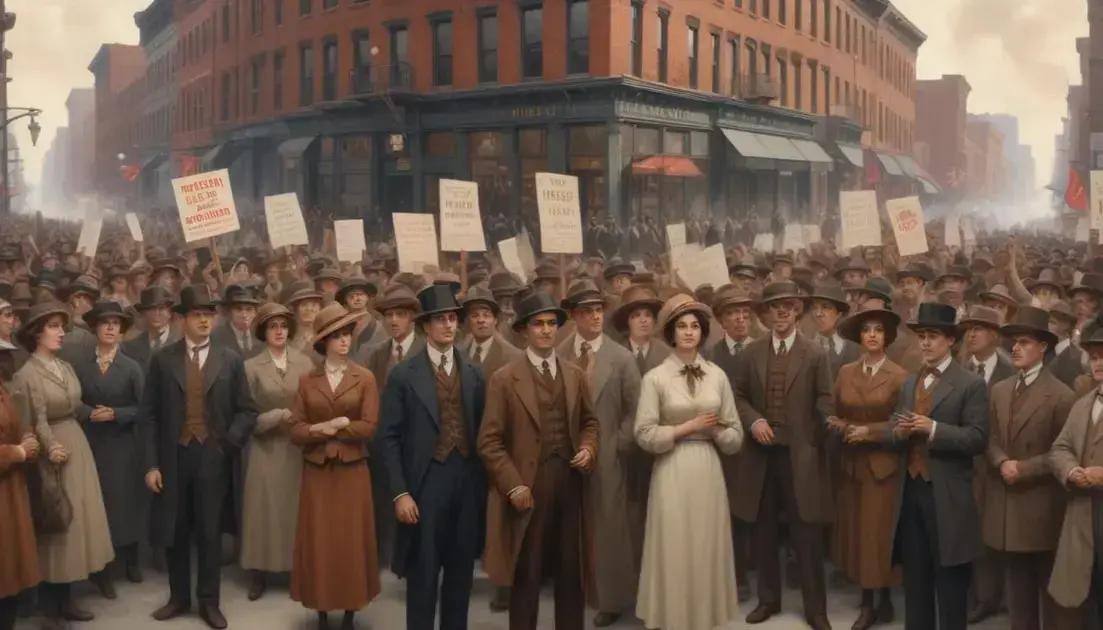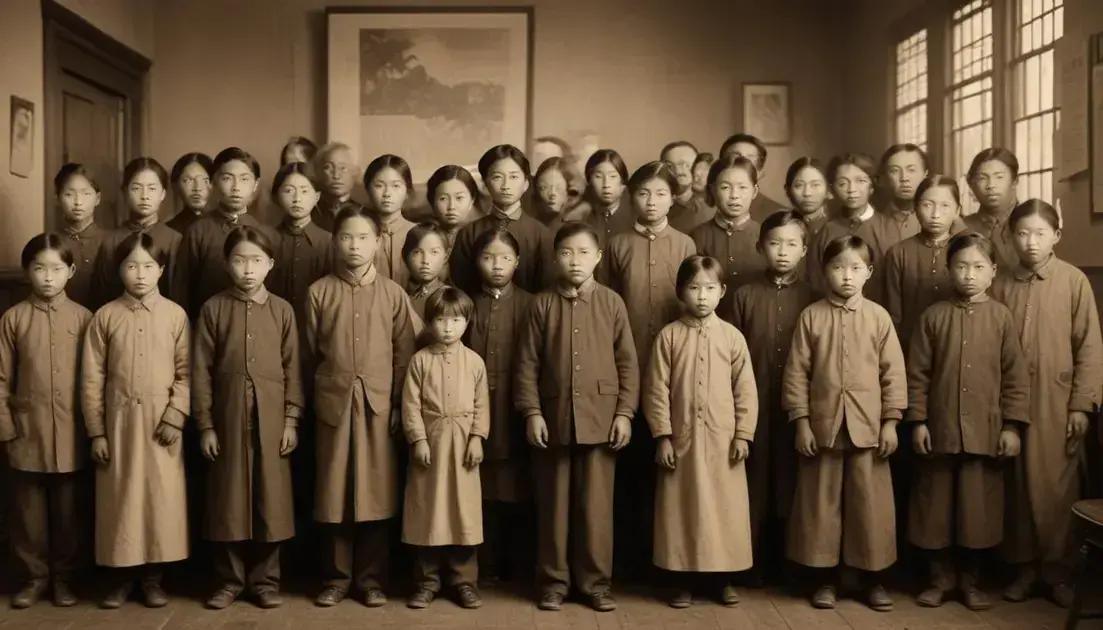
Soweto Uprising: Youth Against Apartheid
The Soweto Uprising of 1976 was a pivotal event in South Africa’s fight against apartheid, where students protested against oppressive education policies. This act of bravery led to significant global awareness about racial injustices, inspiring movements for equality worldwide. The uprising not only galvanized support against apartheid but also highlighted the role of youth in social activism. The legacy of this event continues to influence human rights campaigns today, reminding us of the ongoing quest for justice and equality.
The Soweto Uprising marked a significant turning point in South Africa’s fight against apartheid, as students bravely rallied against oppression. Have you ever wondered how youth can change the course of history?
The Historical Context
The historical context of the Soweto Uprising is vital to understanding its impact. In the 1970s, South Africa was under a strict apartheid regime. This system enforced racial segregation and oppressed the black majority while benefiting the white minority. Black South Africans faced limited rights, poor education, and job discrimination.
The apartheid laws controlled nearly every aspect of life. Black children attended underfunded schools that didn’t prepare them for the future. Education was purely aimed at fitting them into low-paying jobs. As a result, this unfair treatment fueled anger and sparked protests.
Students in Soweto sought change by organizing a peaceful demonstration on June 16, 1976. They demanded better education and an end to the use of Afrikaans in schools. Afrikaans was the language of the oppressors, furthering the divide.
The protest began with thousands of students marching through the streets, holding signs and chanting for their rights. Unfortunately, the government responded violently. Police opened fire on the unarmed crowd. This brutal act turned a peaceful protest into a tragic event.
After the uprising, the world took notice. Photos of the violence shocked many across the globe. This led to a surge of international support for the anti-apartheid movement. The Soweto Uprising became a symbol of resistance against racial oppression.
In understanding the historical context, we see how important it is to remember these events. They shaped South Africa’s struggle for freedom and equality. Today, the Soweto Uprising is a reminder of the power of youth in fighting for justice.
The Uprising
The uprising in Soweto on June 16, 1976, was a turning point in South Africa’s history. It began as a peaceful student protest. Thousands of young people gathered to demand better education and an end to apartheid rules.
Students were frustrated with the education system. They were forced to learn in Afrikaans, a language they didn’t speak or understand. This made it hard for them to learn effectively. They wanted their voices heard, so they took to the streets.
The atmosphere was charged with hope and determination. As the march grew, the students chanted slogans and carried banners. They showed their unity and strength. But the government was not prepared to listen. They viewed the protest as a threat.
Tragically, the police responded with violence. They opened fire on the students, who were mostly unarmed. The brutal crackdown resulted in many deaths and injuries. Images of the violence shocked people around the world. This brutal response drew international attention to the apartheid regime.
The Soweto Uprising wasn’t just a local event. It became a rallying point for the anti-apartheid movement worldwide. People rallied in support of the students. They showed solidarity by protesting against the injustices that were happening in South Africa.
After the uprising, the world saw how committed the youth were to fighting for their rights. Their bravery inspired many others. The legacy of the Soweto Uprising continues to be a powerful reminder of the struggle against oppression.
Reactions and Consequences
The reactions and consequences of the Soweto Uprising were profound and immediate. After the violent crackdown on June 16, 1976, the world was shocked. Images of the protests and the police violence spread quickly. Many countries condemned the South African government for its brutal actions.
As news of the uprising traveled, international support for the anti-apartheid movement grew. Activists, celebrities, and governments began to rally against apartheid. Sanctions and boycotts were put in place to pressure the South African leaders.
Back at home, the uprising ignited anger and activism among black South Africans. Many felt empowered by the bravery of the students. Grassroots movements began to form, urging others to stand up against oppression.
The South African government responded with repression. They increased security measures and cracked down on dissent. More protests followed, but so did more violence. Many activists were arrested or went into hiding.
The Soweto Uprising also changed how the world viewed apartheid. Reports of the brutality led to a shift in public opinion. Before the uprising, many people were unaware of the harsh realities of apartheid. Now, they were educated and motivated to act.
In the years following the uprising, the movement for equality grew stronger. The events of June 16, 1976, served as a turning point for many. They showed that youth could lead the charge in the fight for justice.
Global Impact
The global impact of the Soweto Uprising was immense. It spread awareness about apartheid beyond South Africa’s borders. Many people around the world began to understand the harsh realities of life under apartheid.
Media coverage of the uprising helped ignite international outrage. Graphic images and news stories opened the eyes of many. Activists from various countries rallied to support the anti-apartheid movement. They organized protests and campaigns to demand action against injustice.
Countries started imposing sanctions on South Africa. These included trade restrictions and economic pressure aimed at the apartheid regime. The global community united against the racial injustices faced by black South Africans.
During the 1980s, powerful figures and organizations joined the fight. Celebrities, politicians, and human rights groups pushed for change. They emphasized the need for equality and justice. Songs, films, and books about apartheid gained popularity, further spreading awareness.
The Soweto Uprising inspired numerous movements worldwide. People facing oppression in their own countries drew strength from the bravery of the students. They saw that standing up against injustice was possible and necessary.
Eventually, these global efforts contributed to the end of apartheid in the 1990s. Nelson Mandela’s release and election as president marked a new chapter for South Africa. The world had come together to support a cause that resonated deeply with the fight for human rights.
Legacy of the Uprising
The legacy of the uprising in Soweto is still felt today. This event shaped South Africa’s history and its fight for freedom. The bravery of the students inspired future generations to stand up for their rights.
After the uprising, many young people became active in the anti-apartheid movement. They continued the fight for equality and justice. The sacrifices made during this time helped spark significant changes in the country.
South Africa saw the importance of education in the struggle for human rights. The movement emphasized the need for an education system that served everyone equally. This push for change continues to guide policies today.
Also, the uprising raised global awareness about apartheid. People around the world recognized the fight for justice and equality. This led to a wave of support for those oppressed by the apartheid regime.
Today, June 16 is celebrated as Youth Day in South Africa. It’s a day to remember the courage of those students. Communities hold events to honor their legacy and remind people of the ongoing fight against inequality.
The Soweto Uprising showed that youth can drive change. It proved that standing up against injustice can have lasting effects. The lessons learned from this uprising still inspire activists worldwide.
Conclusion
In conclusion, the Soweto Uprising represents a powerful chapter in the fight against apartheid. It showcases how young people can spark significant change. The courage of the students not only influenced South Africa but also inspired movements worldwide.
The uprising highlighted the importance of education and equality. It helped people recognize the need for justice in all parts of society. The global response to the uprising showed that solidarity matters in the fight against oppression.
Today, as we remember the legacy, it’s crucial to continue advocating for equality and human rights. The lessons learned from the Soweto Uprising remain relevant. They remind us that the fight for justice is ongoing and requires our collective effort.


